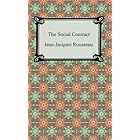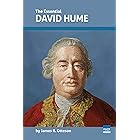| Print List Price: | $4.50 |
| Kindle Price: | $0.99 Save $3.51 (78%) |
| Sold by: | Amazon.com Services LLC |
Your Memberships & Subscriptions

Download the free Kindle app and start reading Kindle books instantly on your smartphone, tablet, or computer - no Kindle device required.
Read instantly on your browser with Kindle for Web.
Using your mobile phone camera - scan the code below and download the Kindle app.

OK
 Audible sample Sample
Audible sample Sample 


On Liberty and Other Essays Kindle Edition
- ISBN-13978-1420934953
- PublisherDigireads.com
- Publication dateJune 24, 2010
- LanguageEnglish
- File size1337 KB
Customers who bought this item also bought
Editorial Reviews
Review
About the Author
John Stuart Mill, British philosopher, political economist, civil servant and Member of Parliament, was an influential liberal thinker of the 19th century. He was an exponent of utilitarianism, an ethical theory developed by Jeremy Bentham, although his conception of it was very different from Bentham's.
A member of the Liberal Party, he was the first Member of Parliament to call for women's suffrage.
John Stuart Mill was born on Rodney Street in the Pentonville area of London, the eldest son of the Scottish philosopher, historian and economist James Mill, and Harriet Burrow. John Stuart was educated by his father, with the advice and assistance of Jeremy Bentham and Francis Place. He was given an extremely rigorous upbringing, and was deliberately shielded from association with children his own age other than his siblings. His father, a follower of Bentham and an adherent of associationism, had as his explicit aim to create a genius intellect that would carry on the cause of utilitarianism and its implementation after he and Bentham had died.
Mill believed that "the struggle between Liberty and Authority is the most conspicuous feature in the portions of history." For him, liberty in antiquity was a "contest... between subjects, or some classes of subjects, and the government.
He was godfather to the philosopher Bertrand Russell.
In his views on religion, Mill was an agnostic.
Mill died in 1873 of erysipelas in Avignon, France, where he was buried alongside his wife.
Product details
- ASIN : B003TU1OY4
- Publisher : Digireads.com (June 24, 2010)
- Publication date : June 24, 2010
- Language : English
- File size : 1337 KB
- Text-to-Speech : Enabled
- Screen Reader : Supported
- Enhanced typesetting : Enabled
- X-Ray : Not Enabled
- Word Wise : Enabled
- Sticky notes : On Kindle Scribe
- Print length : 322 pages
- Best Sellers Rank: #181,303 in Kindle Store (See Top 100 in Kindle Store)
- Customer Reviews:
About the author

Discover more of the author’s books, see similar authors, read author blogs and more
Customer reviews
Customer Reviews, including Product Star Ratings help customers to learn more about the product and decide whether it is the right product for them.
To calculate the overall star rating and percentage breakdown by star, we don’t use a simple average. Instead, our system considers things like how recent a review is and if the reviewer bought the item on Amazon. It also analyzed reviews to verify trustworthiness.
Learn more how customers reviews work on AmazonReviews with images
-
Top reviews
Top reviews from the United States
There was a problem filtering reviews right now. Please try again later.
Once we move past this initial foray into the principles of liberty, Mill furthers his offered opinions. He warns us about the oppression of the ideals of the majority towards the minority. These ideas can be captivating, sometimes to the point of detriment. We can see it in society today, how so many of us find opposing ideas (especially political ones) truly intolerable. If we have progressed to a point in society where we accept other people’s religions and sexualities, why do we struggle so much to accept different ideological points of view? On this, Mill says that “There is no parity between the feeling of a person for his own opinion, and the feeling of another who is offended at his holding it; no more than between the desire of a thief to take a purse, and the desire of the right owner to keep it.” I find this sentiment to be alarmingly true, and may we ring all the bells in the land with its message.
The truth is that there is a necessity for opposition to ideas. That is how shaky ideas become strong or how weak ideas are proven anemic. There is tremendous danger in relegating popular ideas to the forefront of public opinion and vilifying opposition. The best ideas are the ones that have continually stood the test of time, repelling opposition not with crushing force, but with uplifting power. For example, ancient tribes used to sacrifice human lives to the Gods for the hope of a better harvest. As civilizations grew, they eventually decided life shouldn’t be ended so simply. Death then became a punishment for wrongdoing, and over the course of centuries slowly transitioned from barbaric to (relatively) humane. Eventually, as a more modern society emerged, we came to condemn the taking of human life with more frequency, until now it is a rarity. History shows us that the acceptable reasons for ending a human life has been a debate for the entirety of humanity. The reason we live in a world today where you don’t lose your life for stealing a sheep is because enough people, over time, spoke up and said it was a bad idea, preferring alternative punishments. This is but an example of how different opinions on a single subject are required to continually clash and debate as to what is most correct. Here we see the good idea (valuing human life) winning over the bad (seeing human life as insignificant) due to the trials of time and ideological combat.
By today’s standards, much of what Mill writes would be considered Libertarian ideology. Basically, get the government and any oppressive bodies of influence out of the individual’s life. The only exception is when an individual would bring harm to another. This is where the government would have an obligation to step in, ultimately in the pursuit of a safer society for all.
One of the areas that becomes grey is the relationship between parents and their children. Parents have a moral obligation to raise their children to the best of their ability, but what happens if a man has no desire to be a part of his child’s life. Can society demand that he participate against his will? What about a contrary case study with a parent who is raising a child to be an abomination. Does a ruling body have authority to step in and violate the liberty of the parent on behalf of the wellbeing of the child? The answers are tricky and each scenario must be evaluated case by case. Even still, decisions made cannot be assured with one hundred percent certainty and approval from all parties. Hopefully, over time and continual debate, humanity will continue to get better at solving this age-old dilemma.
This balance between societal prosperity and personal liberty is constantly teetering back and forth. It is the crux at where we live. Something I think important to remember, phrased quite eloquently by Mill, goes like this: “In the human mind, one-sidedness has always been the rule, and many-sidedness the exception.” Essentially, if we want to keep our balance as a society, it is important to hear and understand people’s differing ideas. Only with this mutual respect for each other’s ideological liberties can we continue to move forward collectively.
Reviewed in the United States on November 23, 2020
Once we move past this initial foray into the principles of liberty, Mill furthers his offered opinions. He warns us about the oppression of the ideals of the majority towards the minority. These ideas can be captivating, sometimes to the point of detriment. We can see it in society today, how so many of us find opposing ideas (especially political ones) truly intolerable. If we have progressed to a point in society where we accept other people’s religions and sexualities, why do we struggle so much to accept different ideological points of view? On this, Mill says that “There is no parity between the feeling of a person for his own opinion, and the feeling of another who is offended at his holding it; no more than between the desire of a thief to take a purse, and the desire of the right owner to keep it.” I find this sentiment to be alarmingly true, and may we ring all the bells in the land with its message.
The truth is that there is a necessity for opposition to ideas. That is how shaky ideas become strong or how weak ideas are proven anemic. There is tremendous danger in relegating popular ideas to the forefront of public opinion and vilifying opposition. The best ideas are the ones that have continually stood the test of time, repelling opposition not with crushing force, but with uplifting power. For example, ancient tribes used to sacrifice human lives to the Gods for the hope of a better harvest. As civilizations grew, they eventually decided life shouldn’t be ended so simply. Death then became a punishment for wrongdoing, and over the course of centuries slowly transitioned from barbaric to (relatively) humane. Eventually, as a more modern society emerged, we came to condemn the taking of human life with more frequency, until now it is a rarity. History shows us that the acceptable reasons for ending a human life has been a debate for the entirety of humanity. The reason we live in a world today where you don’t lose your life for stealing a sheep is because enough people, over time, spoke up and said it was a bad idea, preferring alternative punishments. This is but an example of how different opinions on a single subject are required to continually clash and debate as to what is most correct. Here we see the good idea (valuing human life) winning over the bad (seeing human life as insignificant) due to the trials of time and ideological combat.
By today’s standards, much of what Mill writes would be considered Libertarian ideology. Basically, get the government and any oppressive bodies of influence out of the individual’s life. The only exception is when an individual would bring harm to another. This is where the government would have an obligation to step in, ultimately in the pursuit of a safer society for all.
One of the areas that becomes grey is the relationship between parents and their children. Parents have a moral obligation to raise their children to the best of their ability, but what happens if a man has no desire to be a part of his child’s life. Can society demand that he participate against his will? What about a contrary case study with a parent who is raising a child to be an abomination. Does a ruling body have authority to step in and violate the liberty of the parent on behalf of the wellbeing of the child? The answers are tricky and each scenario must be evaluated case by case. Even still, decisions made cannot be assured with one hundred percent certainty and approval from all parties. Hopefully, over time and continual debate, humanity will continue to get better at solving this age-old dilemma.
This balance between societal prosperity and personal liberty is constantly teetering back and forth. It is the crux at where we live. Something I think important to remember, phrased quite eloquently by Mill, goes like this: “In the human mind, one-sidedness has always been the rule, and many-sidedness the exception.” Essentially, if we want to keep our balance as a society, it is important to hear and understand people’s differing ideas. Only with this mutual respect for each other’s ideological liberties can we continue to move forward collectively.

Much of the book focuses on discourse and how it should be uninhibited. Utilitarianism is a great tool for such ends. For instance, when environmentalists claim that the planet is being raped and that we have a moral obligation to stop it, a better argument may be the financial and quality of life costs we are accruing.
Mill is one of the great philosophers and has had great influence in America. There's a reason for it: a unique perspective applicable to the greater parts of our society.
Top reviews from other countries
Required reading for a bunch on my courses so a good book to have around. Lots of room to annotate.
Heads up, my copy had a typeset error where the index had an error message in it.












